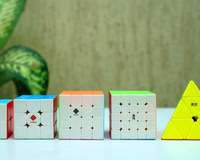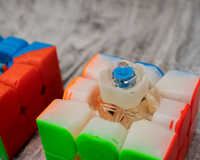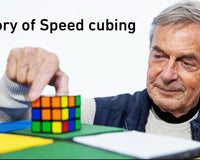Introduction
Improving at cubing is a task that is much easier said than done. In fact, any sport or hobby that relies heavily on practice and upskilling to improve needs you to stay motivated and constantly in touch with it. Speedcubers tend to maintain a practice schedule sometimes, but find themselves at a loss for motivation quite often.

Do you feel this way? Is it getting hard to improve to the extent that your brain is no longer pushing you to cube and spend time on improvement? Well, look no further, because here’s why that’s happening and how you can overcome it.
Understanding The Human Brain’s Motivation
When you look at the broader picture, the human brain is quite simple in its desires. There are 3 main hormones that give you positive feelings such as happiness and satisfaction, namely Dopamine, Serotonin, and Oxytocin. Now, while these names aren’t important, it’s crucial to understand how to activate their release in your brain in order for you to feel happy doing what you’re doing.

Whenever you break a personal best or achieve a small/big goal that you’ve set for yourself, your brain releases one or more of those hormones, making you ‘happy’ and craving for more. It is like a cycle, wherein you do the things that make you happy and use them to keep you motivated to continue doing them.
So, what mechanism can be used to keep this cycle running?
Reward Systems - The Mechanism
Reward systems are useful here because you can use them to stay on track and keep working towards improvement. The idea is that you set yourself tiny goals every time you practice and when you reach them, you reward yourself with something that is rather easy to obtain but still makes you happy. For example, you can reward your brain by saying that you will only allow yourself to eat something really tasty after you achieve this small goal of cubing on that particular day.

Similarly, you can use music, alone time, exercise or any other pastime/hobby as a reward that you access when you finish a certain task. By doing this, your brain gets rushes of dopamine or other associated hormones, motivating it to stay involved in the activity because it eagerly awaits the reward at the end! You can nurture many habits by using this technique and cubing is no stranger to it either.
Cubing as a Reward System
A very common issue is finding the right balance between the things you pursue in order to improve in multiple avenues in life. Balancing cubing with other activities such as studying, etc. can be hectic. However, the concept of a reward system can help you pull yourself out of a slump! This brings about a revolutionary concept, wherein cubing turns into a reward system in itself.
Implementing Reward Systems in your Life
First, make a list of things that you need to get done, based on their order of priority. Arrange them in decreasing order of priority (highest to lowest) and make sure hobbies/interests such as cubing are placed somewhere in the middle so that they don’t take up all of your time. Now, the items higher up on your priority list are naturally more important to finish and you should aim to do them first.

However, a lack of motivation to do them can be solved by using the items just below them as rewards for doing them! For example, if you have to study/finish some important work but you also want to cube, you can use cubing to help accelerate your work by taking small but efficient breaks from work.
During these breaks, you would cube and help ease your mind as you gear up to continue the work after cubing. This way, you are able to improve at cubing in short bursts as well as finish the work that is higher up on your priority list. It is literally that simple, but much harder to implement than it is to ideate. It is a tried and trusted process that many cubers and people use nonetheless to stay in touch with their passions while carrying out other crucial tasks at the same time.
Reward Systems in Cubing
The last section of this article deals with purely the cubing aspect. To improve at cubing by making use of reward systems, think of some things that are easier to get and still give you a hit of satisfaction in doing them. For example, if you enjoy watching TV shows or dancing to music or anything else, you may utilize these to your advantage in order to stay motivated while cubing.

So, when you do, say, a certain number of solves, or get beyond a certain mini-barrier that you’ve set for yourself, you reward yourself by watching the next episode on that TV show that you love, or by dancing and unwinding completely! In fact, this is very good for your mental health, as you are able to cube as well as relax your mind, providing for a fun progress curve.
The basic idea is to save your easy-access pleasures (so to speak) for when you accomplish a certain goal and use that repeatedly to reap the benefits of a well-rounded schedule!
Conclusion
So, whether it is using cubing as a reward system in life or using reward systems to improve at cubing, this whole idea holds biological foundations that, once adopted, can truly change the way you view improvement in life. Additionally, the more you embrace the idea, the better you will be able to apply it to yourself and develop a routine that works for you.
For added improvement, check out these articles about learning new algorithms and grinding, two techniques that are necessary to improve at cubing!
About Author

Akshaansh Chilakapati is a speedcuber from Hyderabad who specializes in big cubes. He started cubing when he was 15 and has 6 years of cubing experience. He loves to play sports, and music and has a passion for astrophysics. He has attended 23 competitions and won a total of 71 podiums with 19 gold medals. He was also ranked 7th in India for the overall Sum of Ranks (SOR).
































